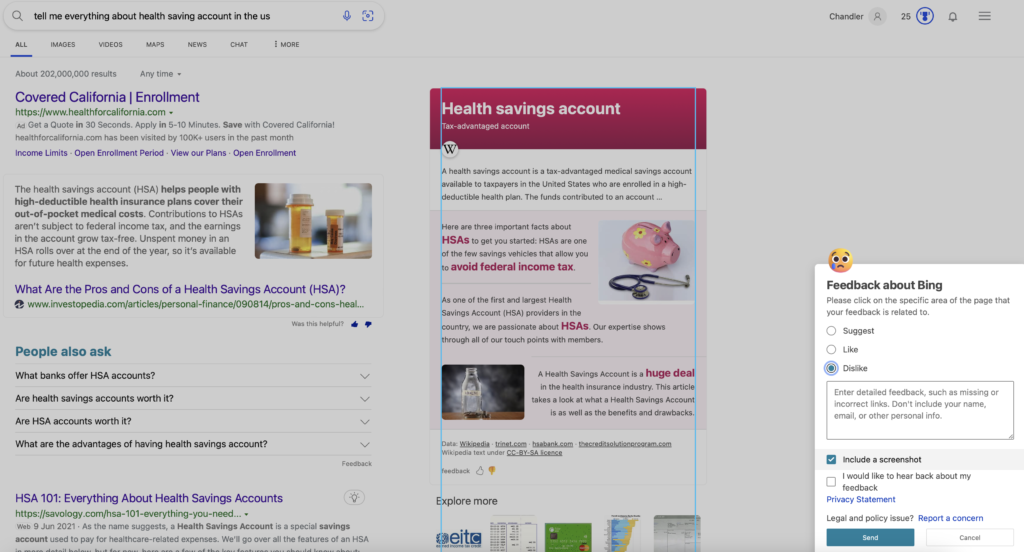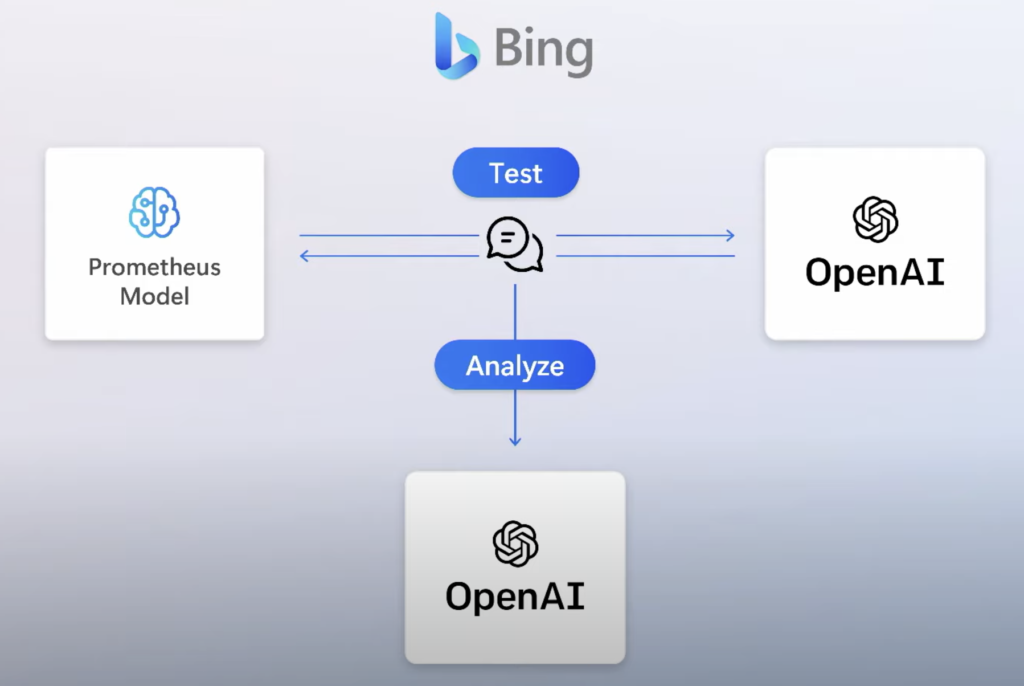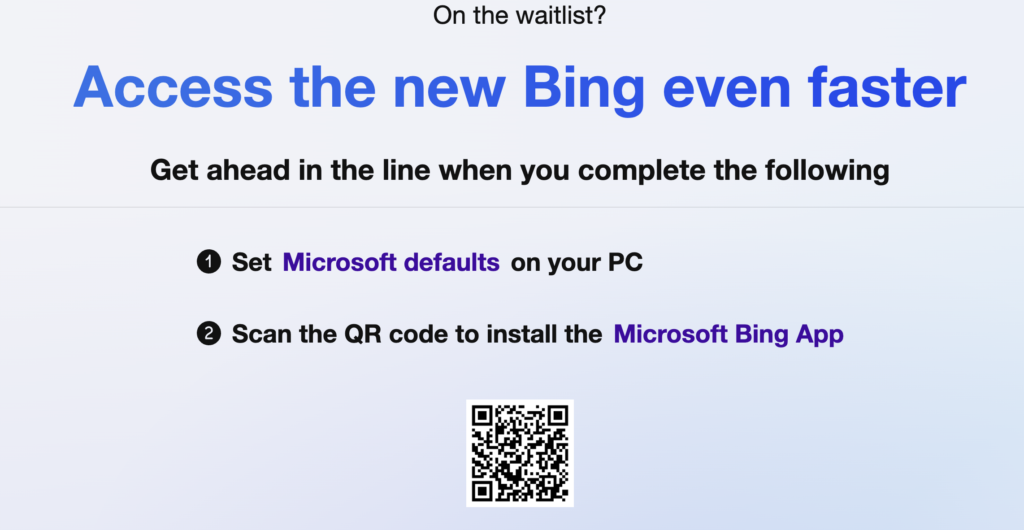Today Microsoft revealed the first iteration of Bing and OpenAI integration, with more about OpenAI capability integration with Office in the pipeline. The news captured a lot of attention because of OpenAI/ChatGPT’s popularity over the past two months.
In his interview with WSJ, Microsoft CEO Satya Nadella made it clear that they are going after Google’s search engine market share with this integration/partnership. From Google’s public financial report, we know that most of Google’s revenue is from advertising, most of which is from Search ads. So any tiny change in Google’s search engine market share might impact Google’s overall top line and bottom line.
In my previous post about why I think chatGPT is not a serious search engine contender, I highlighted three main barriers:
- ChatGPT will need to index the web content beyond text (like video, reviews, and other content)
- ChatGPT training data is old (2021 data) and not real-time. This will not work for search since many search queries require real-time data.
- ChatGPT model doesn’t know which data source/article is more trustworthy/authoritative than others. So while chatGPT may give you very confident answers, the answers are often wrong. ChatGPT doesn’t have the actual knowledge or understanding. Based on training data, the algorithm tries to guess which word should come next in a sentence.
With the Microsoft Bing integration, all of the above barriers are (almost) gone. Bing can help chatGPT index the web beyond text with real-time data. Bing search algorithm can help chatGPT/OpenAI to understand which data source is more trustworthy/authoritative than others.
So now the question is whether this integration (and subsequent iterations) is enough to encourage end users to switch FROM:
- Using Google search TO using Bing Chat to Search, given the conversational nature
- Using Google Search App on mobile devices TO using the Bing App because of its native integration with ChatGPT/OpenAI
- Using Chrome browser TO using Microsoft Edge browser because they can use chatGPT functionality for free
If chatGPT’s user growth is any indication, Google has reasons to worry. (ChatGPT is the fastest app/software that reached 1 million users in history, and it is estimated to reach 100M MAU two months after launch).
While chatGPT started to offer the paid plan at $20/month, the fact that their server is still under strain shows that the demand is high for their product.
In addition, in the past, we saw many blind tests to compare Google’s and Bing’s search results. The difference was small (in the past), and it was not obvious to users which search engine result page they were seeing. So the current big gap between Google’s search market share and Bing’s has a lot to do with user perception, preference, habit, and perhaps the strength of Google’s distribution channels (i.e. being the default search engine on Safari, Chrome, and even Firefox in the past).
So given the above context, the excitement behind chatGPT and openAI, it is understandable that Satya is very bullish about the new “race.”
Google is not sitting still, of course. Sundar Pichai (Google’s CEO) announced yesterday that they would introduce BARD in the coming weeks. Bard is an experimental conversational AI service powered by LaMDA, Google’s version of chatGPT, which they introduced two years ago. I am keen to try BARD whenever I can.
The new Bing UI needs iteration
Trying the new Bing Search with chat box result on the right-hand side, I am not entirely sure if that is the best user experience or it is different from Google’s knowledge graph answer. You can try it yourself by going to Bing or seeing photos taken by The Verge here. (A big caveat, I am using Chrome browser because Microsoft Edge refuses to work on my Mac. T.T I chose the correct Chip version and tried to reinstall twice)
After trying it for a few times with different long queries, the right-side answer only triggered a few times for me. And when it triggered, the answer was not what I expected from a chatGPT-like experience. The answers seem “in-between” the typical search results and answers from chatGPT. This makes it feel clunky. Bing is gathering feedback from users, though, so I hope the UI will improve. I can understand it is not simple to design a suitable interface for a search engine that is different from chatGPT-like interface.

Hands-on experience with Bing Chat is needed
“I am still on the waitlist to try Bing chat, so I can’t comment much on how it feels using it. From what Joanna Stern (from WSJ) showed us via her video recording, Bing Chat can perform essentially the same function as chatGPT but with real-time data from the internet. This is Huge! From what Dena Saunders (Bing Engineering Tech Lead) described at the technical level, the statement “Search will change forever” is not exaggerated.

Bing Chat provides reference sources under its answers to notify the users where the actual “truth” or “knowledge” comes from.
A smart way to improve Bing distribution
I joined the waitlist to try Bing Chat, and at the end of the process, this is the prompt that I received.

This is pretty smart to me because:
- It helps Microsoft to motivate people to install Edge and try it
- Install the Bing app on their phone
- It’s free for Microsoft
How about search engine optimization?
There are many articles about how chat-like usage will impact paid search revenue because it is not easy to design ads to be an intuitive part of that experience and I agree. I also think chat-like usage will majorly impact search engine optimization (SEO) for an important reason. The more satisfied search engine users are with answers given in a chat environment, the more likely they don’t need to visit the external website anymore. This means less traffic from organic search
In conclusion, as an end user, I am keen to watch this space and see how it will evolve. The fact that Google will release Bard soon makes me excited. It does feel like the industry is buzzing with lots of energy again, similar to the early days in the 2000s 🙂
Bing AI gets many factual data wrong
One week after the event, Feb 13, Dmitri Brereton published an article on how Bing AI can’t be trusted. It is a good article, and here is my reaction to it.
Chandler
P.S: The Microsoft event video is here if you are interested to watch it.
[jetpack_subscription_form]